Western Digital WD2500YD: Enterprise on the Desktop
by Gary Key on June 24, 2006 10:00 AM EST- Posted in
- Storage
iPEAK Game Installation Tests
Our iPEAK based Game Installation benchmarks simply show the ability of the hard drive to write data as quickly as possible to the disk based upon the installation software instructions. As detailed in our iPEAK setup description we installed the games from our source drive in order to eliminate the optical drive bottleneck. In separate application timing we witnessed basically the same percentage spread when installing the games via our DVD drive so these results are representative of actual installation performance.

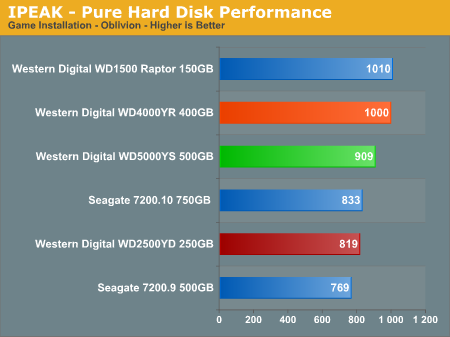
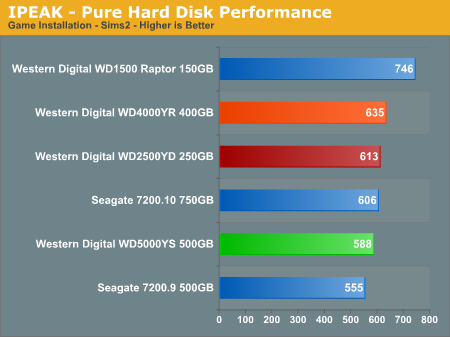
We see both WD RE2 drives performing very well in these benchmarks with the WD Raptor simply dominating the other drives in these tests. The write performance of the WD2500YD is very good in the Sims2 benchmark as the disk utilization results are very consistent along with a close grouping of block sizes in this test. The drive performs well when seek distances are evenly distributed with large block sizes of data. The performance of the WD2500YD trails off in the Oblivion and Battlefield 2 benchmarks as the disk utilization numbers begin to vary along with seek distances that are not serial in nature, but it still remains competitive with the Seagate desktop drives.
iPEAK Game Play Tests
The iPEAK based Game Play tests are centered on the benefits of having a hard disk that can load non-linear or sequential data files quickly without interrupting the flow of the game.
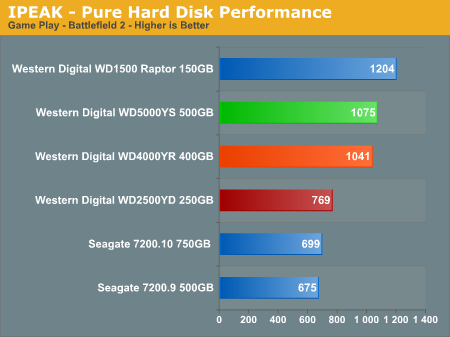
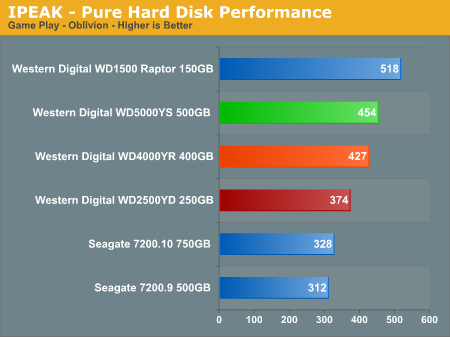
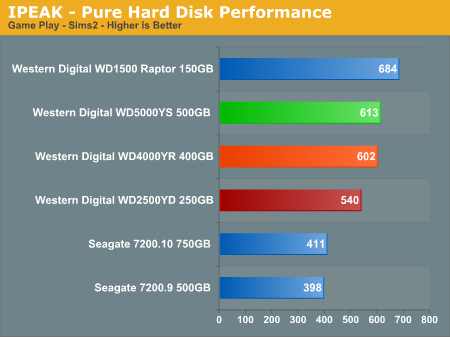
We're sounding like a broken record, but the WD Raptor places first as its 10k RPM spindle speed and optimized cache play an important role in its ability to sustain high transfer rates. The WD2500YD is up to 39% slower than the two RE2 drives but still manages to better the desktop centric drives from Seagate. While these differences sound large, in actual desktop usage most users will not be able to tell the difference except when utilizing the Raptor in certain situations. Also, the selection of platform components will have a far greater impact on a drive's responsiveness than the drive itself in many cases.
Our iPEAK based Game Installation benchmarks simply show the ability of the hard drive to write data as quickly as possible to the disk based upon the installation software instructions. As detailed in our iPEAK setup description we installed the games from our source drive in order to eliminate the optical drive bottleneck. In separate application timing we witnessed basically the same percentage spread when installing the games via our DVD drive so these results are representative of actual installation performance.



We see both WD RE2 drives performing very well in these benchmarks with the WD Raptor simply dominating the other drives in these tests. The write performance of the WD2500YD is very good in the Sims2 benchmark as the disk utilization results are very consistent along with a close grouping of block sizes in this test. The drive performs well when seek distances are evenly distributed with large block sizes of data. The performance of the WD2500YD trails off in the Oblivion and Battlefield 2 benchmarks as the disk utilization numbers begin to vary along with seek distances that are not serial in nature, but it still remains competitive with the Seagate desktop drives.
iPEAK Game Play Tests
The iPEAK based Game Play tests are centered on the benefits of having a hard disk that can load non-linear or sequential data files quickly without interrupting the flow of the game.



We're sounding like a broken record, but the WD Raptor places first as its 10k RPM spindle speed and optimized cache play an important role in its ability to sustain high transfer rates. The WD2500YD is up to 39% slower than the two RE2 drives but still manages to better the desktop centric drives from Seagate. While these differences sound large, in actual desktop usage most users will not be able to tell the difference except when utilizing the Raptor in certain situations. Also, the selection of platform components will have a far greater impact on a drive's responsiveness than the drive itself in many cases.










11 Comments
View All Comments
driveguy - Monday, June 26, 2006 - link
I do not understand why the YD family was reviewed so late in it's life.The YS familily has been introduced from 160-500GB on a common platform.
It would make much more sense to review the current product.
Gary Key - Monday, June 26, 2006 - link
We reviewed the recent product life update to the YD family that changed it to the RE16 family with 16MB cache and 3GB/s SATA support. The YS family (160GB~320GB range) just started shipping in volume earlier this month and samples are arriving shortly in the 160GB and 250GB sizes. We received the 320GB YS today that will be tested against the other 320GB drives from Western Digital and Seagate in the near future. Thank you for the comments.
driveguy - Tuesday, June 27, 2006 - link
Hi Gary,Thank you for your response.
YS goes from 160GB to 500GB. The real attraction for the RE products is reliability more than performance. This is really not something you can review because you will not have access to field failure rates but these drives have done quite well in high duty cycle envirements. They have crushed STX NL models in the market with the absolute lion's share of this market.
Gary Key - Wednesday, June 28, 2006 - link
Hi,I could have been a little clearer in my 160GB~320GB statement, my point was those drive sizes just started shipping in volume this month. The 400GB and 500GB drives were shipping in May although we have not received the 400GB sample yet. I think with the YS series WD has brought the nearline performance up to and at times exceeding the SE16 line now. I think it will be interesting comparing the NL35.2 to the WD YS series since both are new product releases. We are implementing a 16 drive RAID chassis for enterprise/benchmark testing shortly so we should be able to look at some failure rate information this time next year in this market segment.
Thanks...
Squidward - Monday, June 26, 2006 - link
By looking at this article and others I've seen the Raptor is hands down the best drive you can get without going into SCSI drives. How does that apply to real usage, is the difference that notable versus the other drives in this article? I've been considering buying one if the difference is truly noticable, particularly as it applies to game loading times and recording tv programs.tallman45 - Saturday, June 24, 2006 - link
Nice job as always with the review.A more valuable comparison IMHO though would have been like cost competitors such as the new 74GB 16mb cache Raptor and the 7200.10 320gb Seagate. It stands to reason that a $300 150GB Raptor had better outperform a $90 250gb YD
Gary Key - Saturday, June 24, 2006 - link
Hi,We have the new 74GB 16MB cache Raptor arriving in about 10 days. We have completed our testing on the Seagate 320GB 7200.10 and are in the process of completing several other 200GB~320GB drives for a desktop roundup shortly in what we believe is the best price to performance range at this time. Our 500GB roundup and PVR article will be available in late July. As stated in the article we will also do a separate review on RAID performance with both nearline enterprise and desktop drives in the near future. The process of adding additional multi-tasking benchmarks along with doing both hardware (Areca) RAID and soft (nF500) RAID is painstakingly slow. ;->
The other process we have setup is an additional test bench that is currently running previously reviewed drives 24/7 with varying stress tests so we can start reporting on reliability and doing a quick follow-up on the drives performance every few months. In about two weeks, you should start seeing storage articles from us about every 10 days.
Thank you for the comments.
Gary Key - Saturday, June 24, 2006 - link
Where is the edit button? :) I meant to end my reply with "storage reviews from us about every 10 days or less."dhei - Saturday, June 24, 2006 - link
150gig raptor is around $200 now...dhei - Saturday, June 24, 2006 - link
forgot to add the 75gig Raptor is only $130. In terms of pure performance most people would go for the little premium in price for Raptor than more hd space. They just get a 200+gig drive for backup and install main apps on raptor.